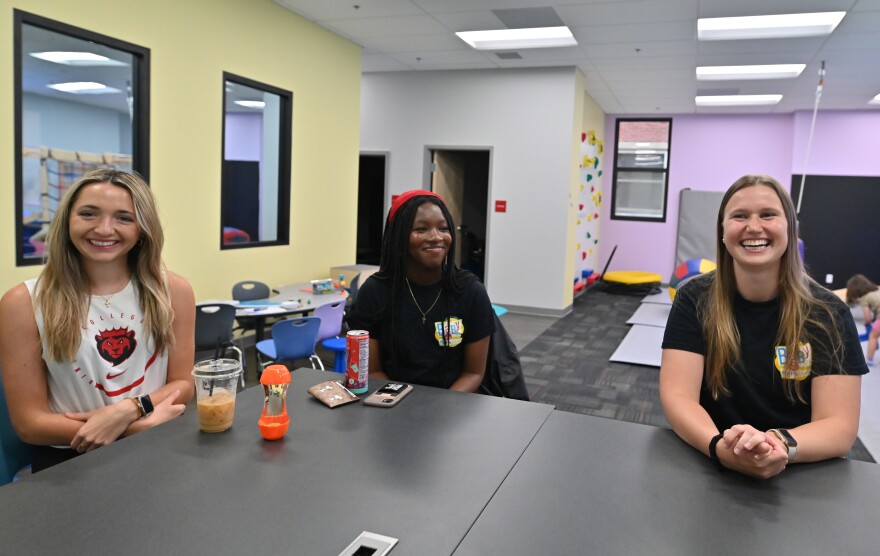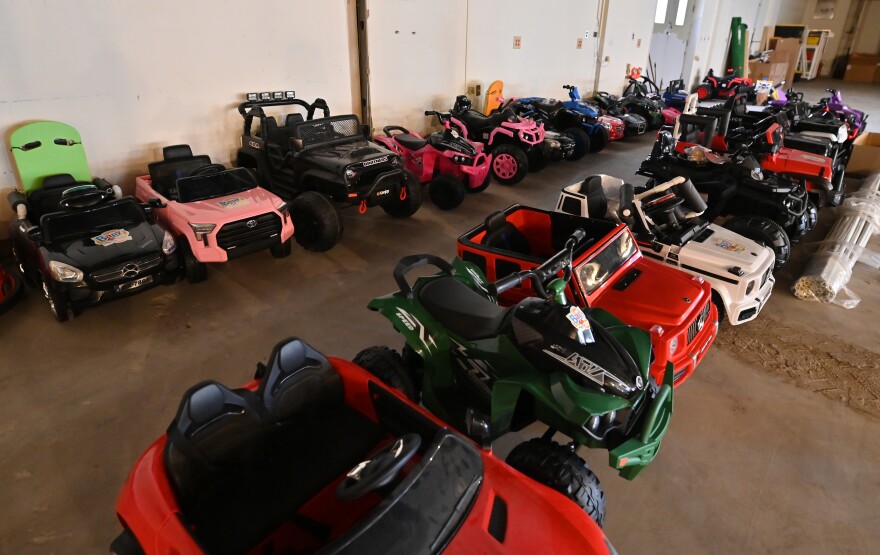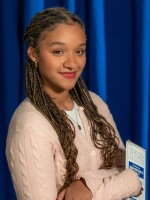Abigail Gernhart raced her brother down the hallway of King’s College’s Frank and Carolyn Kowalski Center for Advanced Healthcare in Wilkes-Barre.
The five year old drove a battery-power toy car. Her brother Matthew, 7, ran. They laughed as the tires whirred.
The Gernhart family received the car for free from King’s Go Baby Go club in December.
For families like them, the car is less expensive than commercial medical equipment like wheelchairs — and more fun.
Her Chevy is bright yellow, and Abigail personalized it with stickers of characters from the movie "Cars." Her mother, Amanda Gernhart, watched proudly.
“She has cerebral palsy,” her mother said. “It affects her right side, so her right hand is weaker and her right leg. In order to drive a motorized car, it's really hard for her to push on the gas," Gernhart said.
King's engineering students collaborate with club members to customize cars to each child's needs. Abigail is able to control the car just from the steering wheel.
"When I saw this, I thought, this would be great, because it could help her access a fun toy that most kids get to use, but because of the cerebral palsy kind of limits her,” Gernhart said.
The National Institute of Neurological Disorders and Stroke defines cerebral palsy as, “a brain disorder that appears in infancy or early childhood and permanently affects body movement and muscle coordination.”
Abigail is one of less than ten other children who received cars from the King's club. Gernhart said she mostly uses it to play with her older brother.
“We have a nice wide driveway where her and her brother will race each other, which is really cool to set up cones and have their own races,” she said. "... they can play together like any other siblings should.”
King’s Go Baby Go chapter
Go Baby Go is a national program that started at the University of Delaware. It modifies ride- on cars for children with physical limitations or disabilities to help them move independently and socialize with other children their age. King’s started its chapter in 2023.
Erika Golik helped to found the chapter as part of her doctoral capstone experience in her post professional occupational therapy program.
“It's a very unique experience, getting to work with the engineering students, community members and then share this, the beauty of occupational therapy with the families,” Golik said.
The cars are donated from community members. King's Go Baby Go chapter hosts build days where members, student engineers and faculty work on the cars.

Golik said the cars help children gain social confidence.
“We're looking for children that have either a neurological condition, developmental delay or just a general overall delay in their mobility,” she said. “This could be that they're not walking at the typical age that children usually walk. They are walking, but maybe they can't keep up with their friends or peers, like on the playground or outside.”
Golik said the next phase of the club will be social groups to conduct research on how to support the families long term.
Cross collaboration between occupational therapy and engineering
Families can return the cars for a size upgrade as the children grow. They can also come back to the club for adjustments.
Each car is unique.
“We had one girl that had low vision, so to give her a little bit more of awareness of where the car was, we added these almost like backup sensors in a car, so the engineers helped modify that and attach it to the vehicle, which was really cool to see done,” Golik said. “Our first kiddo had a G - tube and a feeding backpack, so we added a hook on the back so she could kind of hook that on and still ride while getting her medical care.”
Each car features a remote control option for parents. But the engineering students install push to start buttons on the steering wheel, as well as an emergency kill switch on the back for parents.
“We want them to be the one to initiate the button, versus the parent making them go so that they have that feeling of independent movement,” Golik said.
Gratifying experience for Go Baby Go’s student leaders

Bryanna Nelson and Betsy Allen are co- vice presidents of the club and rising seniors in King’s occupational therapy program. They apply their classroom knowledge to the club’s work.
“It makes me just even more excited to go into the field. When we actually see the kids with them and see how we could have a direct impact on their lives, it's like, oh my gosh. I'm ready to get out in the field. I want to go do stuff right now,” Allen said.
To them, it’s a gratifying experience.
“It means so much because it feels very fulfilling knowing that all of us can come together and make an impact on someone else,” Nelson said. “I think about these kids and their families, and it's like that kid might have felt a little bit more behind or alone, and now they don't have to feel like that. They get to be with their peers. They get to reach their own milestones, just in a different way.”
Helping children with disabilities build confidence
Meeting the families is a highlight for club members.
“These kids, like, they're so young and they're not even trying and they're inspiring college students,” Allen said.
Gernhart encourages other families to look into the club and get their child a car.
“It built [Abigail's] confidence in being able to keep up with her seven-year-old brother, who loves to go fast and racing is really important to him,” she said.
“It feels amazing. I'm really proud of her, and then I can see that she's proud of herself. It just makes you feel so great in your heart to know that she can do things that the cerebral palsy could be holding her back from."







